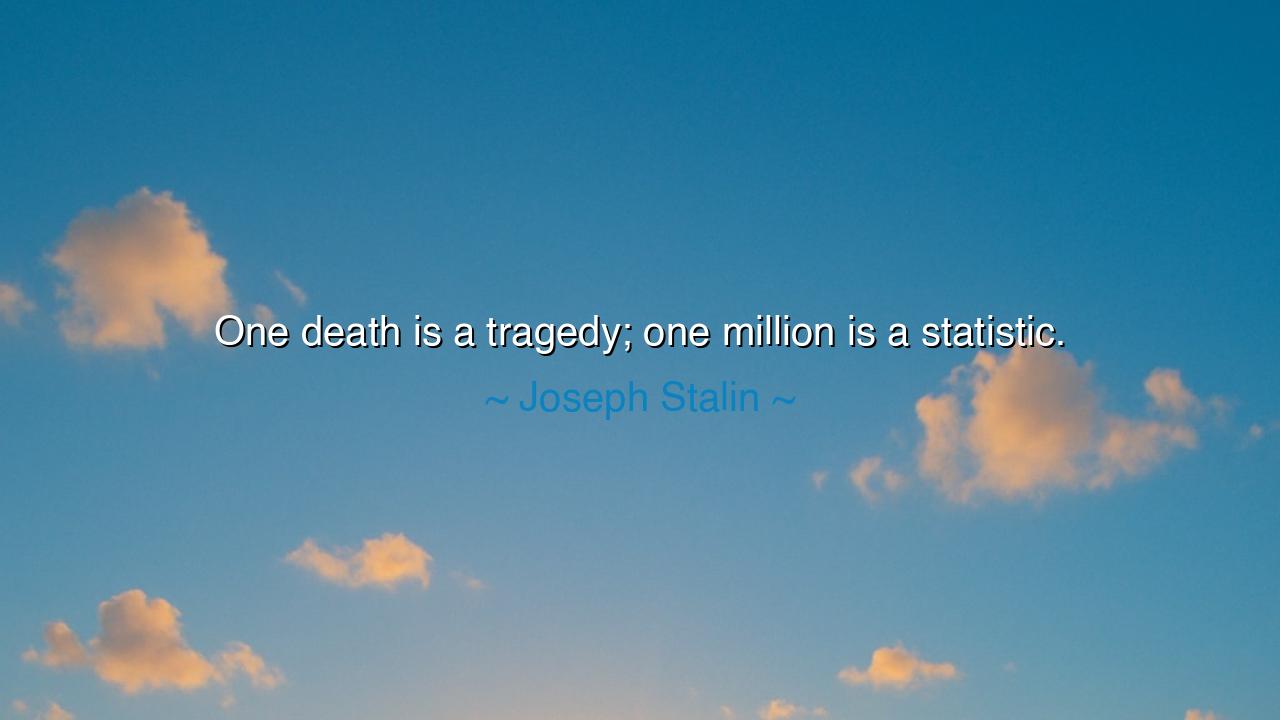
One death is a tragedy; one million is a statistic.






“One death is a tragedy; one million is a statistic.” — so spoke Joseph Stalin, a man whose hands shaped empires and stained history with the blood of countless souls. His words, though cruel and chilling, reveal a truth as dark as the depths of human indifference. They are not the wisdom of compassion, but the mirror of apathy, reflecting how easily the heart grows numb when suffering multiplies beyond imagination. And yet, from this cold utterance, a deep lesson arises — that we must fight against the deadening of our spirit, and never let the weight of numbers bury the sacredness of one life.
In this quote lies the paradox of human nature: that the sorrow of a single lost soul pierces us like a blade, while the suffering of thousands becomes a cloud too vast for our minds to grasp. The tragedy we can see, touch, and weep for. But the statistic, distant and faceless, slips into abstraction — and thus, mercy fades. When Stalin spoke these words, he spoke from the throne of desensitization, where empathy is replaced by control and compassion by calculation. It is a warning from history that when the human face disappears behind numbers, evil finds its easiest path.
Consider the story of a single child during the Holocaust — a boy named Janusz Korczak’s orphan, who held his teacher’s hand as they walked together into the gas chambers of Treblinka. One child, one moment — and our hearts break. Yet when we hear that six million were murdered, our minds stagger and fall silent, unable to hold such horror. Thus the tyrant’s quote reveals its venomous truth: when we fail to feel for the many as we do for the one, we open the gates for cruelty to thrive. Every genocide, every war crime, every famine of neglect is born first in this numbness — when compassion gives way to statistics.
The ancients would have seen this as a corruption of the soul. To them, every life was a reflection of the divine — a spark of eternal light. In their wisdom, they taught that when even one spark is extinguished unjustly, the universe itself mourns. The Stoics said, “He who kills one man, kills the world entire,” for in every being resides the boundless potential of humanity. But modern man, intoxicated by power and progress, counts lives as figures, not flames. In doing so, he forgets that the measure of civilization is not its strength or wealth, but its compassion — its ability to feel the pain of the smallest and weakest among it.
Yet, let us not despair at this darkness, for even from the coldest truth can rise a moral awakening. The lesson of Stalin’s words is not to emulate them, but to defy them — to remember that every number hides a story, every statistic conceals a heartbeat, and every tragedy begins when we cease to care. We must train our hearts to see the unseen, to mourn the multitude as deeply as the one. For empathy is not weakened by being shared; it is strengthened, like a flame that grows when passed from torch to torch.
In our own time, we see suffering multiplied by distance and distraction. A famine across the sea, a war in another land, refugees nameless and unseen — they become numbers in reports, mere “data.” But wisdom calls us to resist this blindness. To feel deeply is not a burden; it is a duty. Write the name, tell the story, see the face — this is how we keep our humanity alive amid the statistics.
So, my child of tomorrow, remember this teaching: when you hear of suffering, do not let your heart retreat behind the shield of numbers. Seek the single soul within the multitude, and honor it. Grieve for one, care for one, help one — for in doing so, you touch the essence of all. A tyrant measures by totals; the wise measure by tears. And as long as one heart still beats with compassion, the world, though wounded, still lives.






AAdministratorAdministrator
Welcome, honored guests. Please leave a comment, we will respond soon